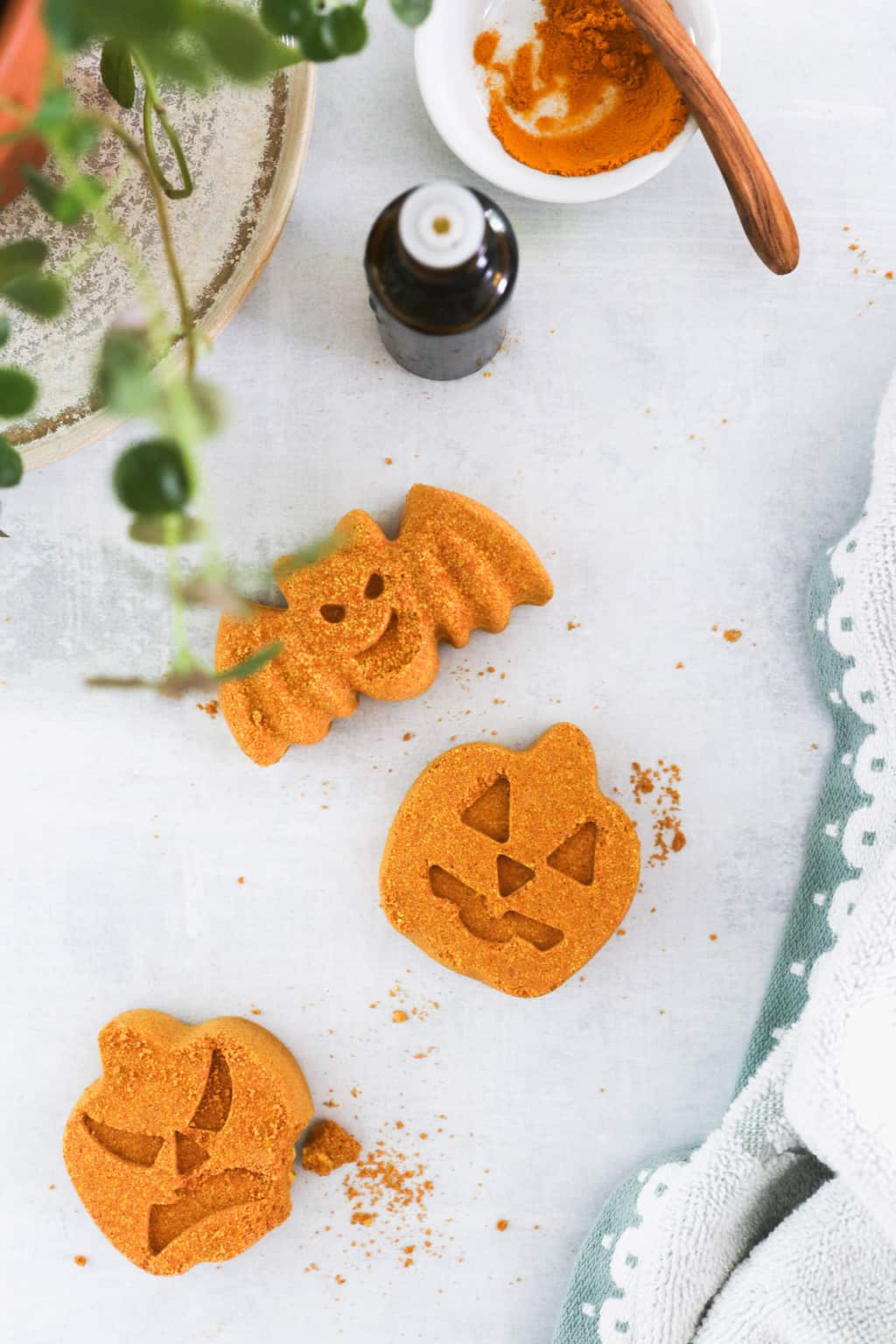[ad_1]
Halloween really brings out the kid in me, so it seemed like the perfect time to make a new batch of bombs. And since Lush bath bombs are always the coolest, I took my inspiration from one of their current offerings (and one of my personal faves) – the turmeric latte. Using their ingredients as inspiration for my copycat DIY, I whipped up these Lush-like Halloween bath bombs in 30 minutes flat.
And guys, they’re so good.
Do bath bombs ever really get old? I’m that person who eats soup in August and enjoys a long, hot soak in the dead of summer. So I’m going to say nope, they’re a year-round luxury.
When it comes bath bombs, ingredients matter. You don’t want to be soaking in a tub full of chemicals or iffy ingredients, so I try to keep things as pure as possible when making my own. Not only is turmeric a great way to add some festive Halloween cheer to your bath bombs, but it’s so, so good for your skin.
Aside from turmeric, these bath bombs contain a plethora of other good-for-you ingredients.
Jump to:
Ingredients
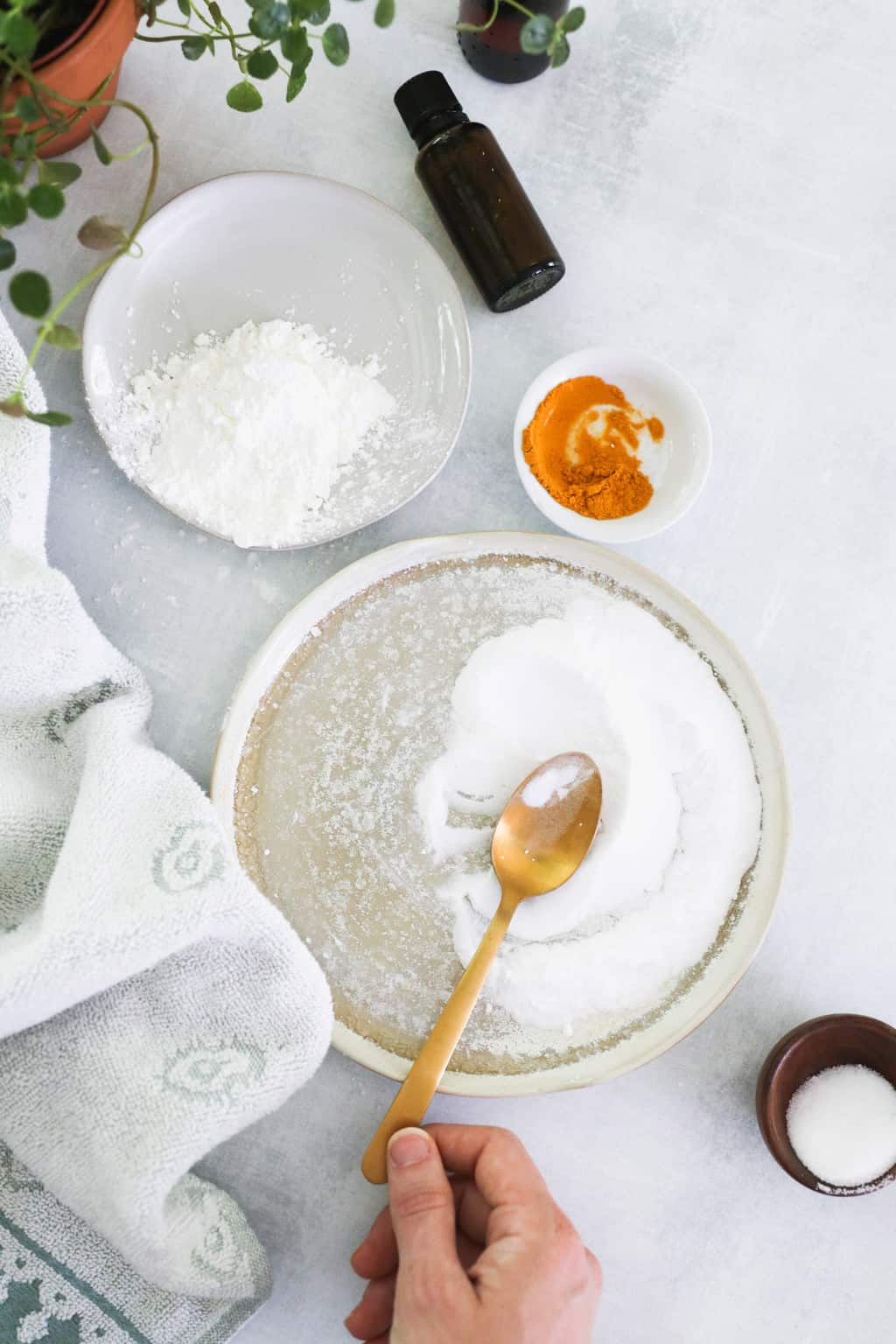
Aside from the standard bath bomb ingredients—baking soda and citric acid—they also contain things like coconut milk powder, vanilla absolute, gardenia extract and iron oxides for natural color.
Turmeric —Thanks to its anti-inflammatory and antibacterial properties, turmeric is said to work wonders on problem skin. It helps reduce redness from blemishes and inflammatory skin conditions like eczema and rosacea, while also encouraging skin regeneration, boosting collagen and diminishing the effects of free radicals.
Coconut milk powder — Made by grating fresh coconut and mixing it with water, coconut milk powder is super soothing for parched skin. It’s naturally high in fatty acids, vitamins and minerals that brighten skin and restore moisture. Plus it’s a great cleanser that deep cleans pores without making breakouts worse.
Coconut oil — Homemade bath bombs are notoriously crumbly, so we used melted coconut oil to help hold everything together.
Skin-safe mica powder — Mica powders aren’t mandatory, but they’re a great way to give your Halloween bath bombs an orange hue without irritating sensitive skin (like some spices) or causing an allergic reaction.
See recipe card for quantities.
Instructions
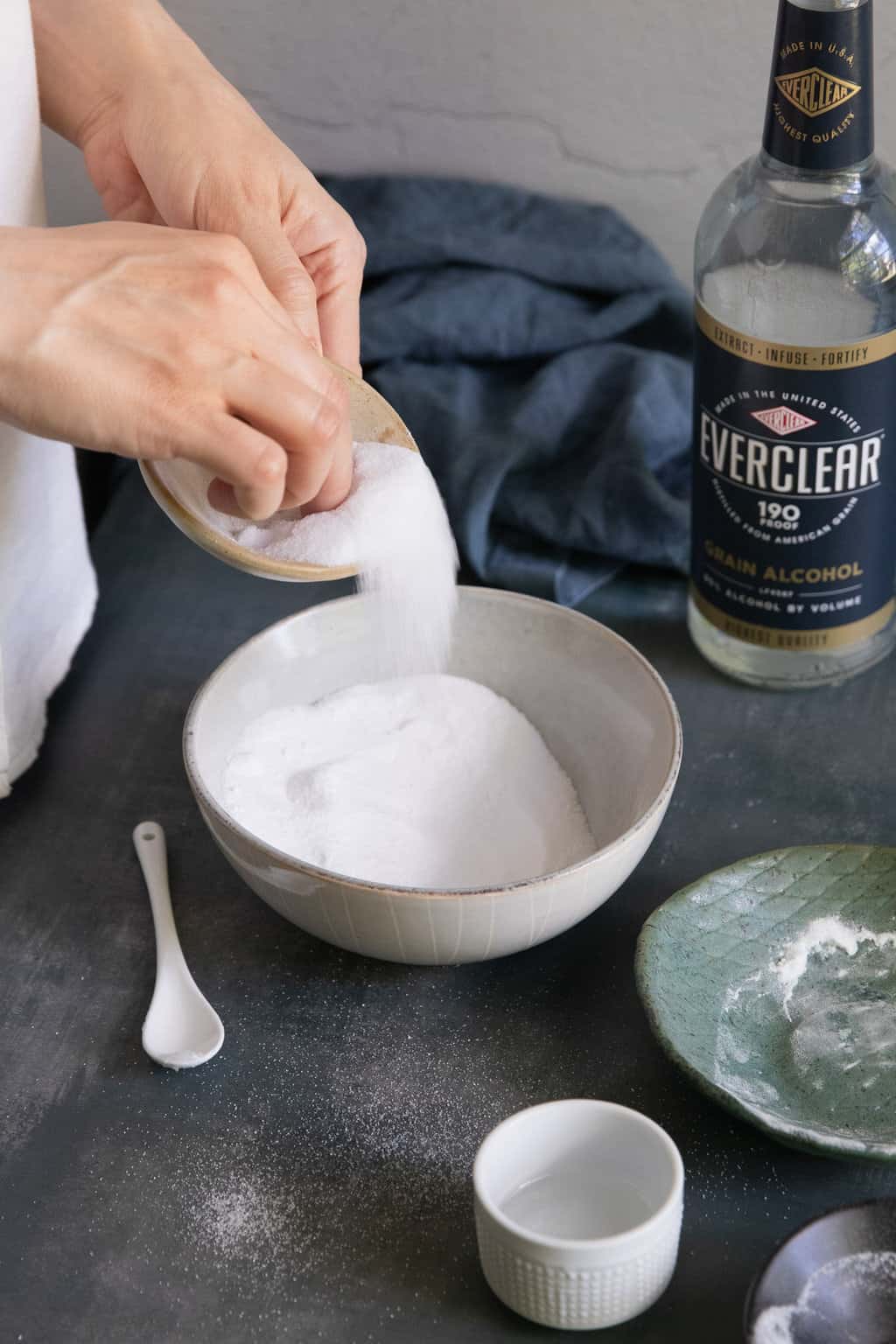
Mix dry ingredients: Combine the baking soda, citric acid, and coconut milk powder in a medium bowl. Whisk well to combine the ingredients and break apart any chunks.
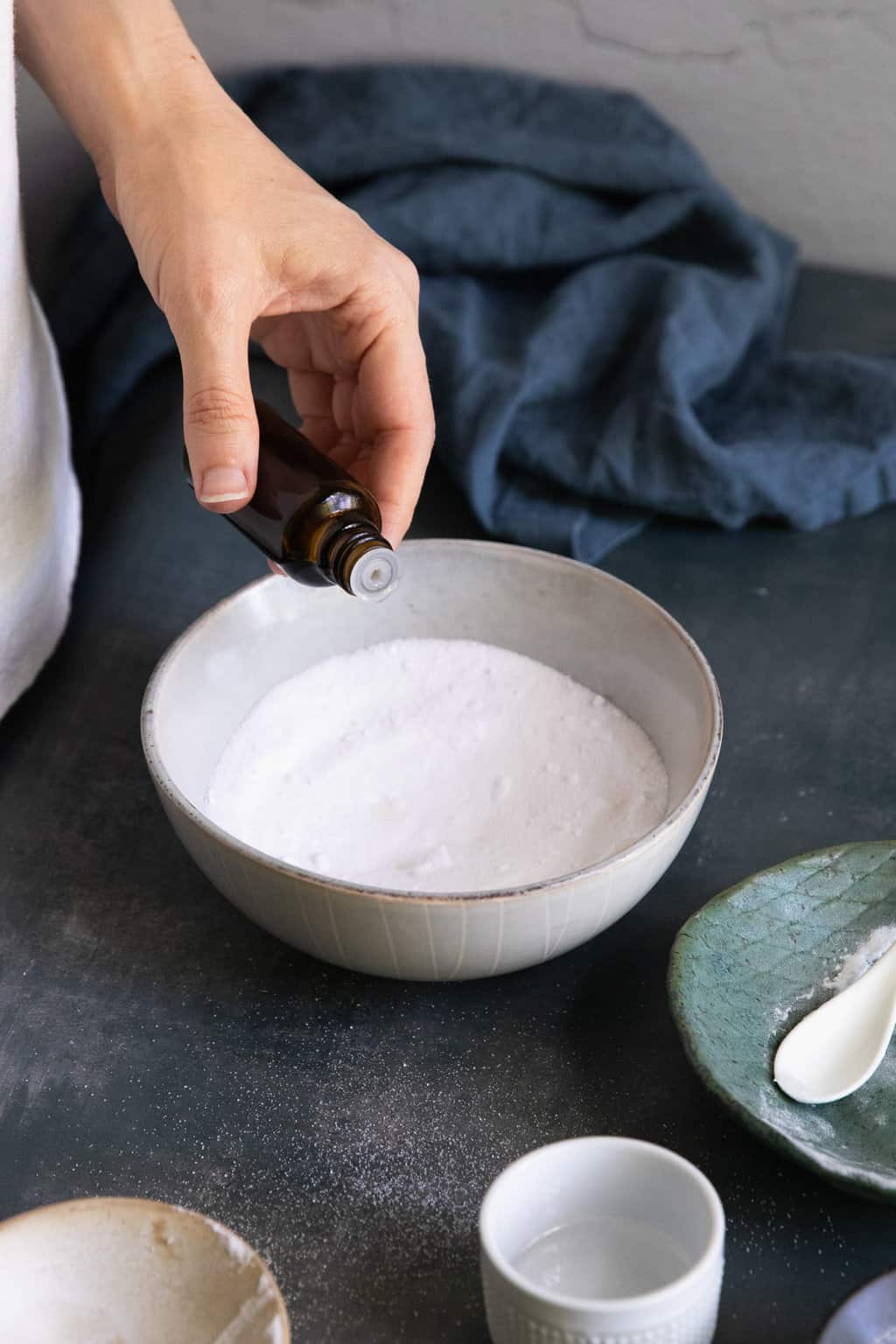
Add wet ingredients: Slowly add the melted coconut oil and essential oils. Whisk again and use your hands to break apart clumps and disperse the oils.
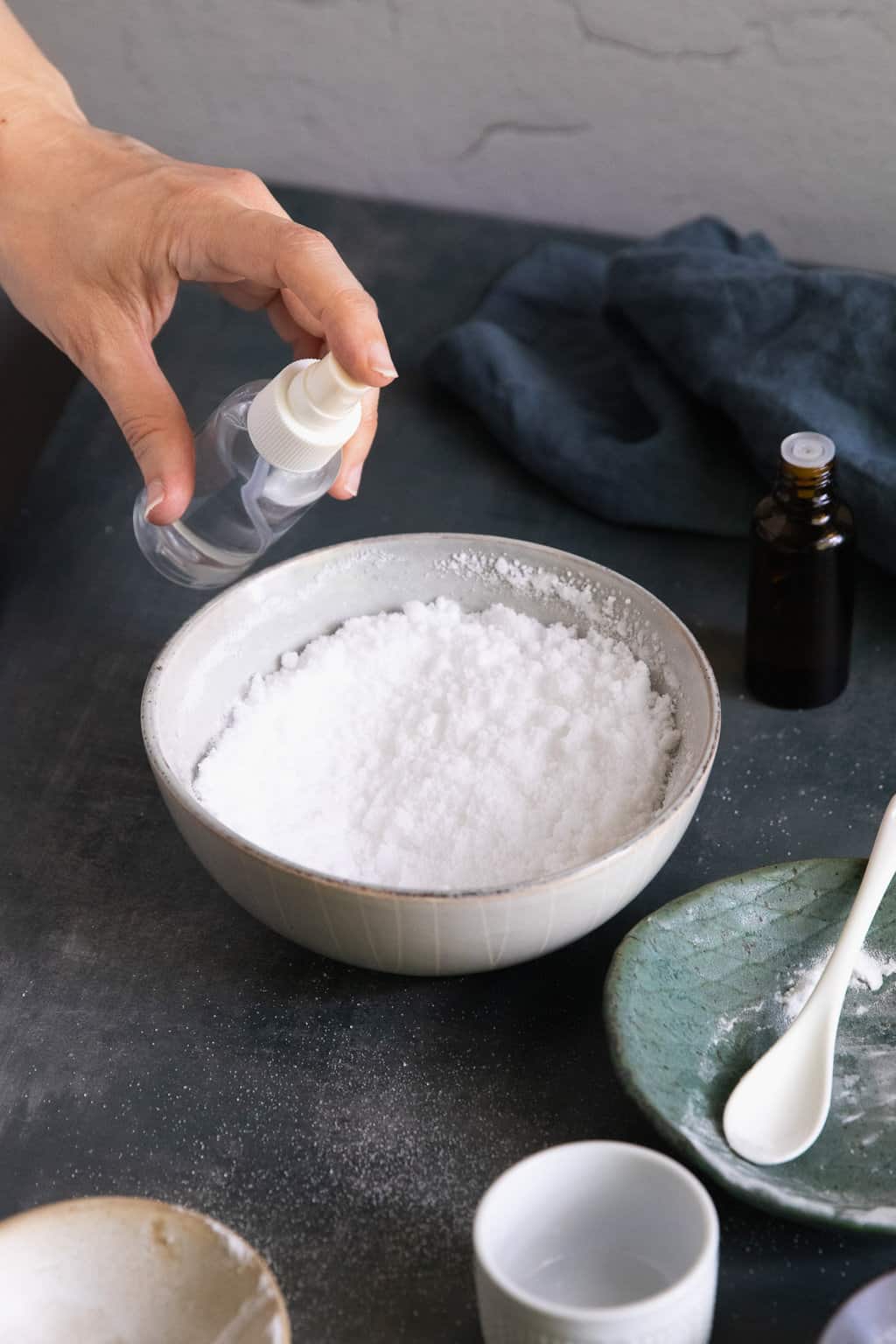
Spritz with water: You’ll see some fizzing, but not too much. Stir the mixture to incorporate the water, then use your hands to test the consistency. It should stick together like wet sand. If it’s still too dry, spritz with a little more water, then test again.
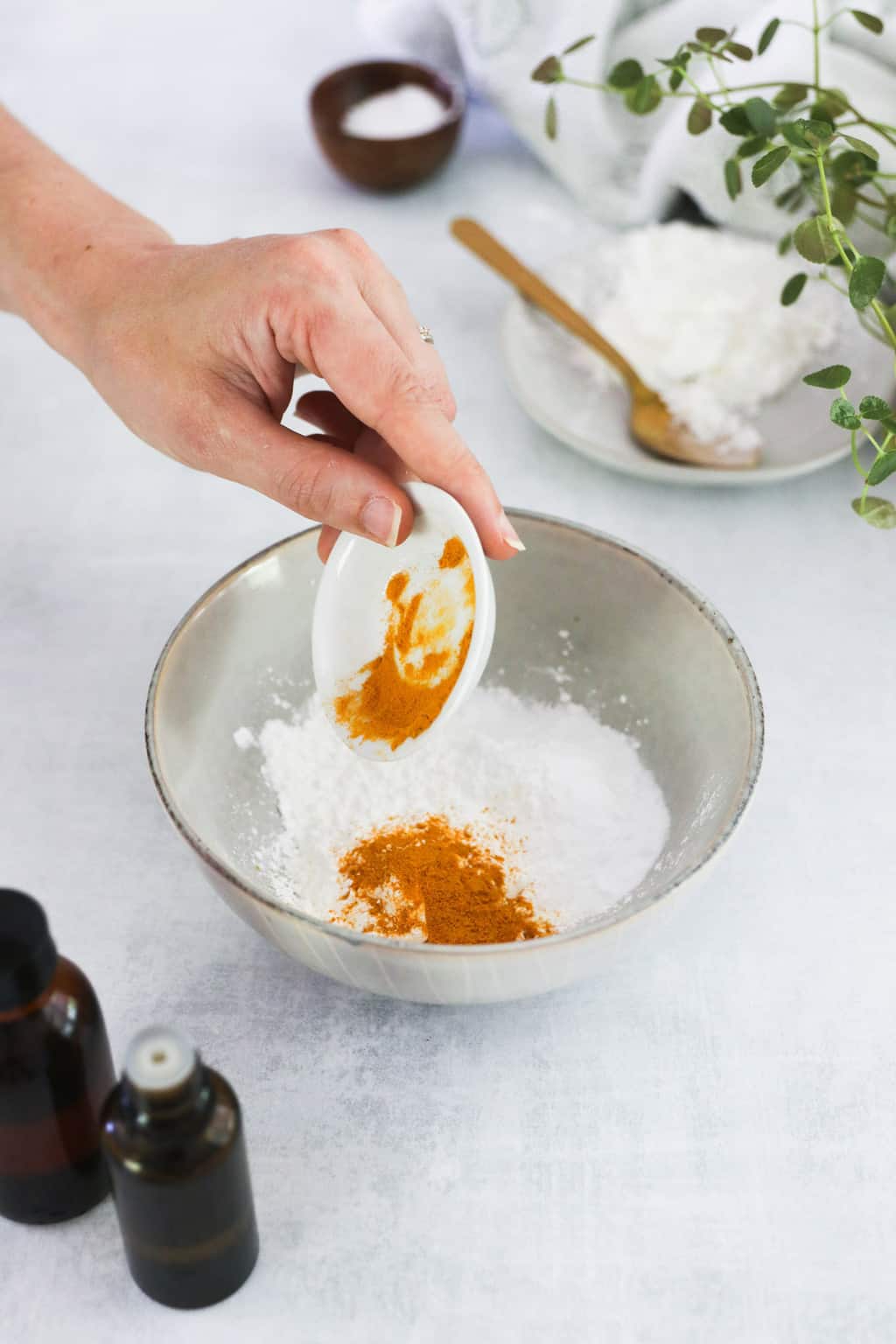
Create your colors: If you’re making bath bombs in multiple colors, divide the baking soda mixture among several smaller bowls (one for each color). Add your turmeric, activated charcoal, or another colorant in teaspoon increments until you reach the desired shade. Stir well.
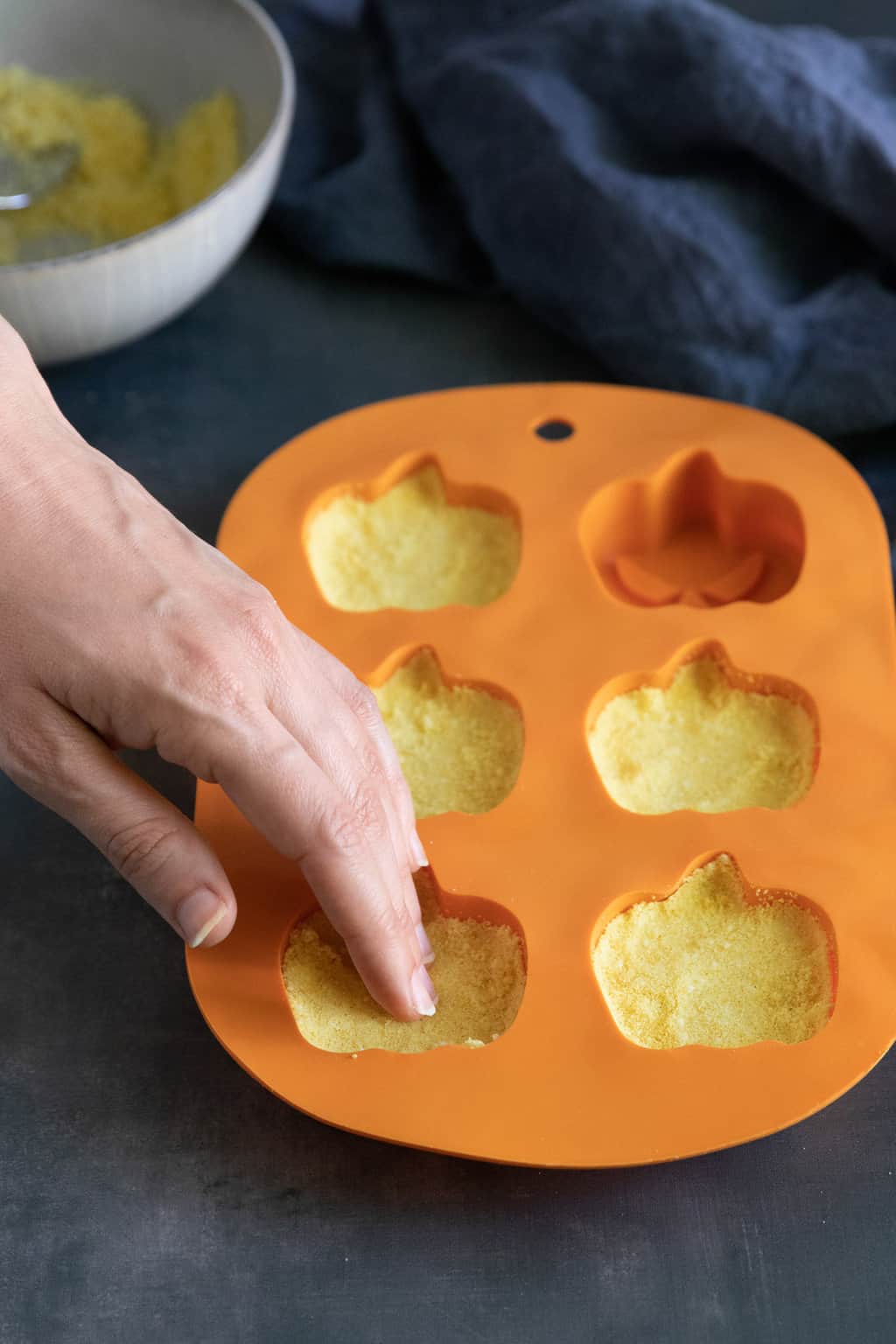
Spoon into molds: Press down firmly. Then wash hands immediately to keep your fingernails from staining. Pop the molds into the freezer for 10 minutes to let the coconut oil solidify then remove from the mold.
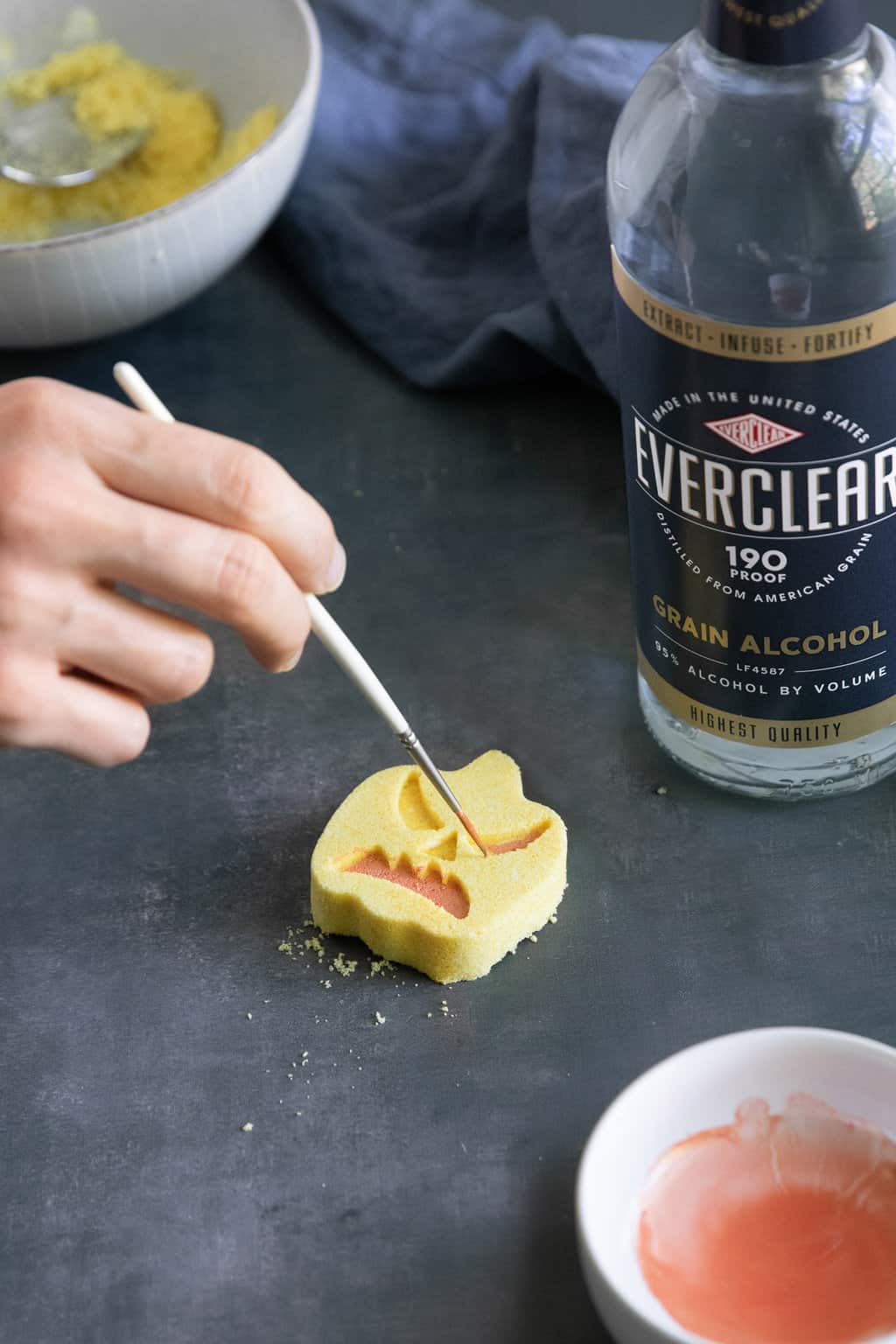
Paint bath bombs: Make your mica “paints” by mixing a small spoonful of mica with several drops of grain alcohol. Use a small paintbrush to paint the eyes, nose, or mouth. Let your bath bombs dry overnight before using.
Substitutions
Carrier oil – Coconut oil makes it a lot easier to remove the bath bombs from the mold, but you can also use almond oil (or another carrier oil) instead. The bombs will just be a little more delicate.
Halloween colors — Use food-grade, skin-safe colorants to create vibrant Halloween colors like orange, black, green, or purple in your bath bombs. Mix and match to create different spooky effects. For natural colors use turmeric, activated charcoal, or another spice like cinnamon for similar spooky effects.
Seasonal essential oils — Use Halloween-inspired scents such as pumpkin spice, or apple cider to give your bath bombs a seasonal aroma. Feel free to keep things simple by sticking with individual oils, like blood orange, nutmeg or frankincense. Or take your bath bombs to the next level with these seasonally scented fall essential oil blends.
How to Paint Bath Bombs
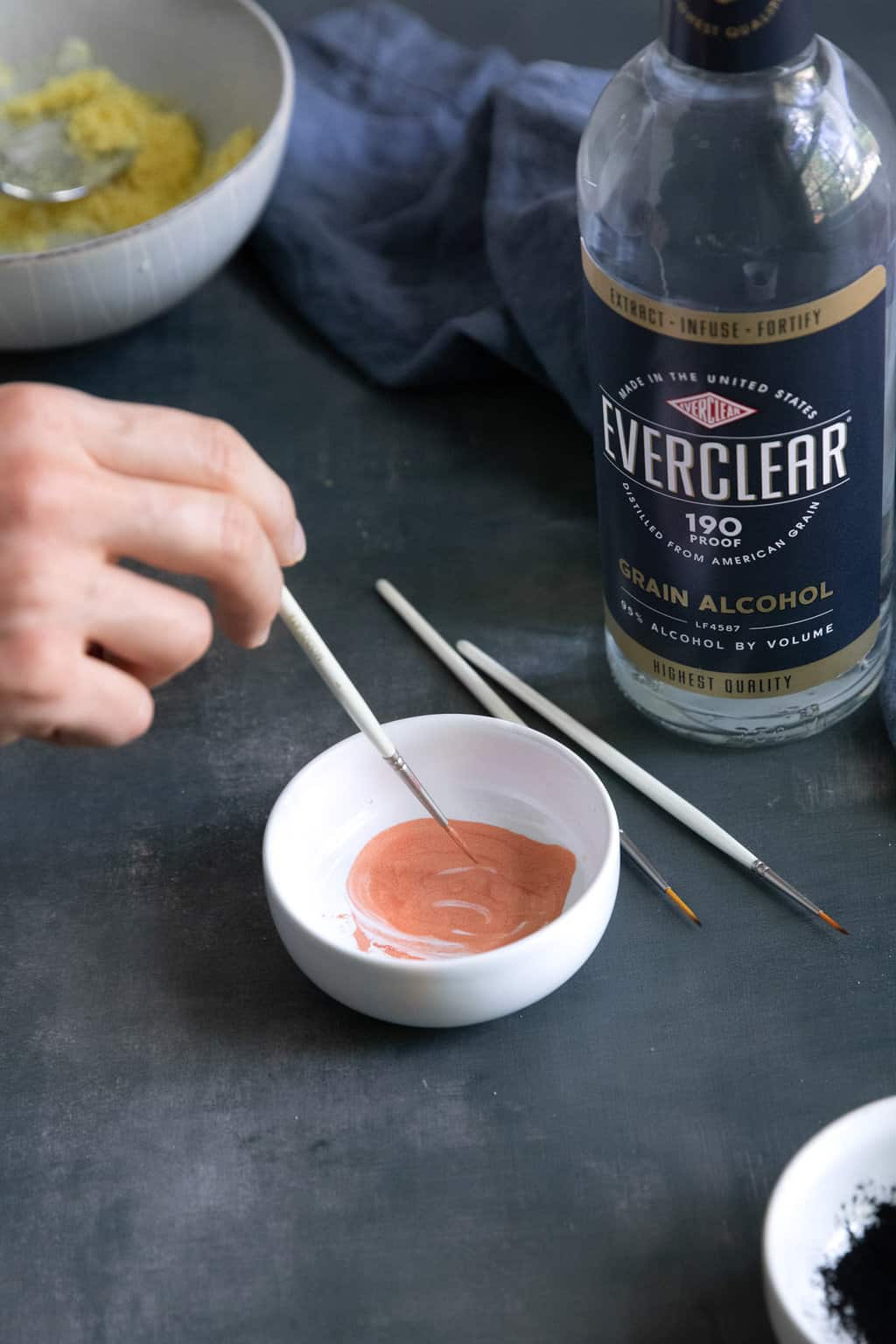
To decorate your bath bombs with colorful “paints” made from mica powder and Everclear grain alcohol. Thanks to its high alcohol content, Everclear evaporates more quickly than water, so you don’t have to worry about setting off the fizzing reaction.
Simply combine a few drops of alcohol with mica in a small bowl, and paint the details with a fine brush. Then let it dry.
You’re left with spooky—but not too spooky—bath bombs, perfect for kicking back during the witching hour.
More Halloween Bath Bomb Ideas
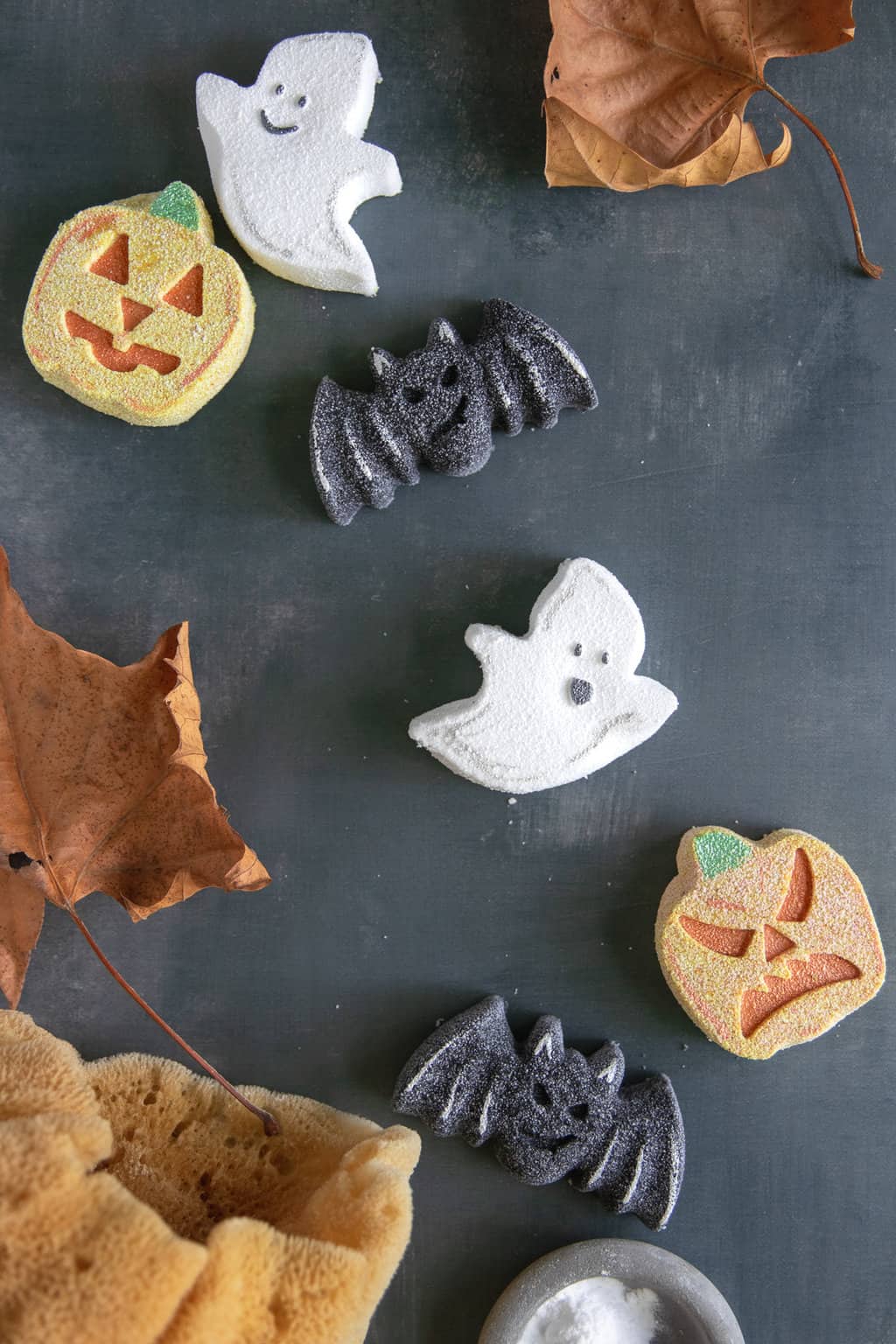
Charcoal bath bombs: Activated charcoal gives a festive Halloween feel to black bath bombs while also providing nourishment for the skin.
Green bath bombs: Use 2 teaspoon of spirulina or green mica powder (use extras to make your own eye shadow!) and 20 drops of a green-scented essential oil (like eucalyptus, mint, or a custom blend).
Glow-in-the-Dark bath bombs: Add glow-in-the-dark pigments to your bath bomb mixture to create a spooky effect. When you turn off the lights, your bath bombs will glow, adding an extra element of fun to your bath.
Eyeball surprise: Embed small, edible candy eyeballs or gummy worms inside your bath bombs. When the bath bomb dissolves, these surprises will float around, creating a fun and creepy effect.
Layered colors: Create a layered look with different Halloween colors. For example, you can layer black and orange or green and purple to make your bath bombs more visually appealing.
Spider web design: Use a small paint brush to draw spider webs or other spooky designs on your bath bombs with black or dark-colored bath bomb mixture.
Crackle effect: Achieve a crackle effect by mixing a small amount of activated charcoal with your bath bomb mixture. This creates a dark, eerie look that resembles cracked or aged surfaces.
Fizzy witch’s brew: Create a bath bomb that resembles a bubbling witch’s brew by using different colors and embedding small items like toy spiders, bones, or other spooky items in the center.
Halloween Bath Bomb Molds
Fun Halloween silicone molds are the key to these spooky bath bombs! You can create Halloween bath bombs in the shape of pumpkins, ghosts, bats, or use Halloween-themed colors and scents like orange, black, or spooky scents like pumpkin spice.
Try these molds with pumpkins or these with skulls or these 3D ghosts. This option has a bit of everything: pumpkins, bats AND witch hats. And these molds are very kid-friendly.
Using Turmeric Bath Bombs
Simply drop one in the tub, and watch it unleash its skin-soothing ingredients as it erupts in a sea of bubbles.
There will inevitably be a bit of staining with turmeric bath bombs. Give your tub a good scrub after your bath (I find that scouring powder works great and it gets rid of soap scum to boot) to prevent any long term discoloration.
And use an old towel to dry off and maybe even hop in the shower to rinse off your skin. Any staining of the skin should fade within a few hours to a day.
Storing Bath Bombs
Bath bombs can last up to 6 months to a year if stored in an airtight container away from moisture. They may crumble or start fizzing prematurely if you keep them in a damp bathroom.
FAQ
No, it’s not recommended. Always use water-soluble, skin-safe colorants designed for bath and body products to avoid staining the skin or the bathtub.
Turmeric can stain, so it’s essential to use a minimal amount and ensure it’s well-mixed with other ingredients. Rinse the tub immediately after use and avoid using turmeric bath bombs if you have light-colored grout.
It depends on your skin’s sensitivity. Test a small area first, and if there’s no adverse reaction, it should be safe to use. However, be cautious of potential staining.
More Turmeric Recipes
If you want more ways to incorporate turmeric into your routine, check out these recipes as well:
Copycat Lush Halloween Turmeric Bath Bomb Recipe
Make pumpkins and fun Halloween shapes with a copycat Lush Halloween bath bomb recipe that includes anti-inflammatory turmeric and coconut milk powder.
Yield: 6 bath bombs
Cost: $12
Equipment
-
Silicone Halloween mold
-
Medium bowl
-
Small paintbrush
Instructions
-
Combine the baking soda, citric acid, and coconut milk powder in a medium bowl. Whisk well to combine the ingredients and break apart any chunks.
-
In a separate bowl, whisk together the melted coconut oil and essential oils. Then slowly add to the dry ingredients. Whisk again and use your hands to break apart clumps and disperse the oils.
-
Spritz with water (there will be a little bit of fizzing—don’t panic!). Stir the mixture to incorporate the water, then use your hands to test the consistency. It should stick together like wet sand. If it’s still too dry, spritz with a little more water, then test again.
-
If you’re making bath bombs in multiple colors, divide the mixture among several smaller bowls (one for each color). Add your turmeric, activated charcoal, or another colorant in teaspoon increments until you reach the desired shade. Feel free to add more turmeric for color, just remember that the more you add, the more it will stain your tub. Stir well.
-
Spoon into molds and press down firmly. Pop the molds into the freezer for 10 minutes to let the coconut oil solidify then remove from the mold.
-
Make your mica “paints” by mixing a small spoonful of mica with several drops of grain alcohol. Use a small paintbrush to paint the eyes, nose, or mouth. Let your bath bombs dry overnight before using.
Notes
Make sure you give your tub a good scrub after your bath (I find that scouring powder works great and it gets rid of soap scum to boot) to prevent any long term discoloration. And use an old towel to dry off and maybe even hop in the shower to rinse off your skin. Any staining of the skin should fade within a few hours to a day.
This post was medically reviewed by Dr. Rina Mary Allawh, M.D., a dermatologist who performs adult and pediatric medical dermatology, skin cancer treatment and cosmetic dermatology. Learn more about Hello Glow’s medical reviewers here. As always, this is not personal medical advice and we recommend that you talk with your doctor.
[ad_2]
Source link
